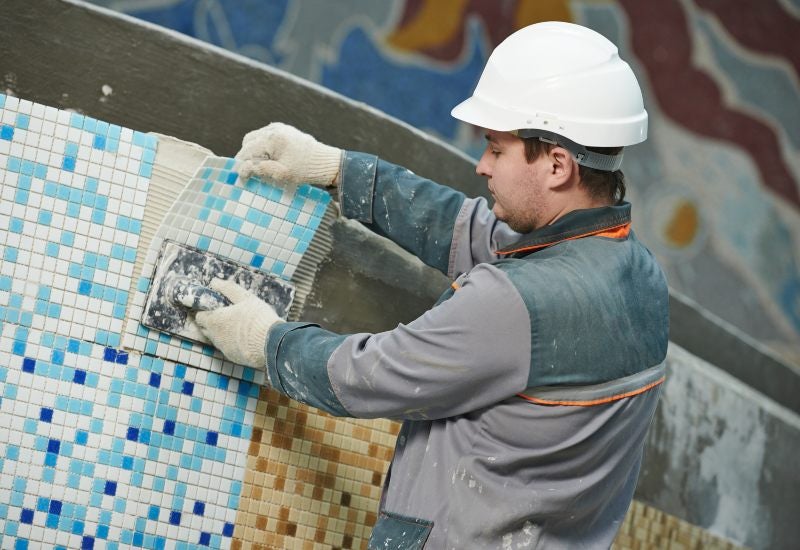We Provide Pool Resurfacing & Replastering in Salt Lake City
Revive Your Home’s Pool with Salt Lake City’s Pool Experts
Your home’s pool should be an inviting oasis that you’re proud to show off to your friends and family. But when your plaster or pool lining begins to crack and warp, it can affect your pool’s beauty and function. At Deep Blue Pools & Spas, we’re proud to offer the Salt Lake City community expert pool resurfacing and replastering services. With over 20 years of experience in the pool industry, we’re here to help your pool look its best all year round.
Signs Your Pool Needs Resurfacing
If your pool needs to be resurfaced, there are a few signs you’ll notice. Keep an eye out for:

- Flaking or Peeling: If you have a plaster pool, it can start to peel when the water has a very low pH for too long. The water will cause the calcium hydroxide in the plaster to dissolve, which leads to flaking or peeling. Unfortunately, this type of damage cannot be repaired and will require replastering.
- Staining: There are several things that can cause surface staining on your pool. This includes calcium, plant matter, flowers, and more. Mild staining can be removed using a special solution, but more severe staining may not come out, and the surface will need to be replastered.
- Rough Texture: As time goes by, the chemicals used to maintain pool water can roughen up the surface of your plaster. Pool etching, a process that results from low alkalinity, can leave dents or lines in your plaster. A simple replastering will help smooth out the surface of your pool.
- Cracks: Any type of crack in your pool’s plaster or surface can be a major problem. Pool cracks can lead to leaks, which can be extremely expensive and time-consuming to repair.
Costs of Resurfacing a Swimming Pool
When it comes to pool resurfacing costs and pool replastering costs, there are many factors that will affect the final number. The amount of time and labor required to complete the project are major factors, as well as the material you choose. Many costs will be calculated based on the square footage of your pool, so a larger size will tend to cost more. We’ll work with you to create a resurfacing plan that fits both your needs and your budget.
What is the Best Material to Replaster a Pool?
If you’re looking to replaster or resurface your pool, you may be wondering which material is best for your property. The truth is that each material will have its own pros and cons, meaning that your needs will dictate your choice. Plaster is a popular choice because it protects concrete surfaces from wear. It also comes in a variety of colors to suit any aesthetic preference. Meanwhile, concrete is known for its durability and versatility—plus, it can be painted any color and is easy to repair with resanding. Our custom pool experts can walk you through your options and find the right fit.
Pool Resurfacing vs. Pool Replastering
Pool replastering refers specifically to the process of removing the old, worn-out plaster from the pool’s surface and applying a new coat of plaster. By contrast, pool resurfacing is a more comprehensive pool repair process. While it includes replastering, it also involves inspecting and repairing other elements of the pool’s structure, such as the underlying gunite or concrete shell. Resurfacing can also involve replacing waterline tiles and repairing or replacing pool coping.
How Often Does a Saltwater Pool Need to Be Resurfaced?
In general, a saltwater pool will need to be resurfaced every 8 to 10 years. As for a standard pool, this number could be anywhere from 10-15 years. However, for both standard and saltwater pools, the exact number can vary based on factors like the weather conditions in your area, the amount of wear and tear your pool sees, and how well your pool is maintained. If you’re not sure of the right time to resurface your pool, we can take a look and let you know the best course of action.
How Long Should Pool Surfaces Last?
The lifespan of your pool surface will change based on the type of material. White plaster, exposed pebbles, tile, and white quartz can last anywhere from 10 – 15 years, while ceramic tile can last even longer than 15 years.
Contact Our Pool Replastering Company in Salt Lake City Today!
When it’s time to replaster or resurface your pool, there’s no better choice than Deep Blue Pools & Spas. With decades of experience repairing, building, and maintaining local pools, homeowners know they can trust us for long-lasting, beautiful work. Get in touch with us today to schedule your consultation!
Why Choose Us?
- Small Company, With Big Service
- Owner Operated
- Impeccable Customer Service
- All Employees Are Certified Pool Operators
- Well Trained, Knowledgeable Staff
